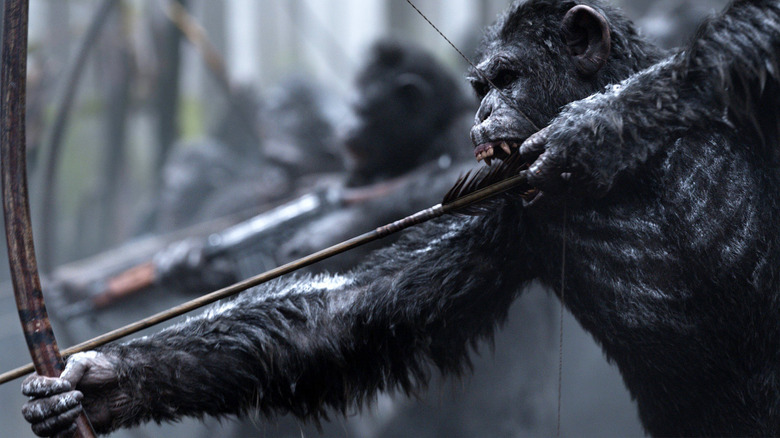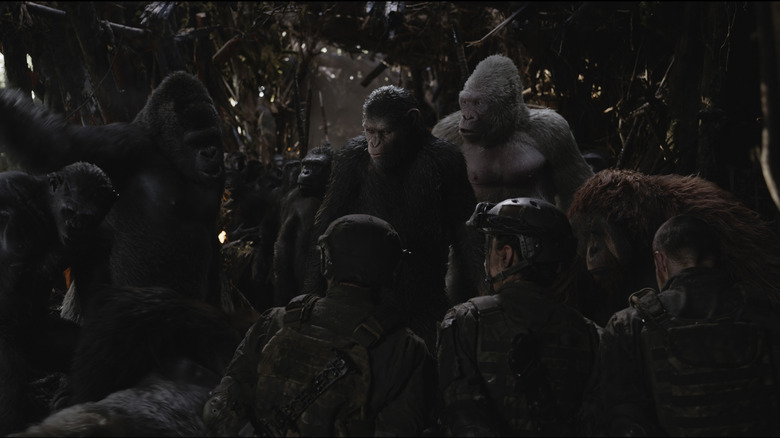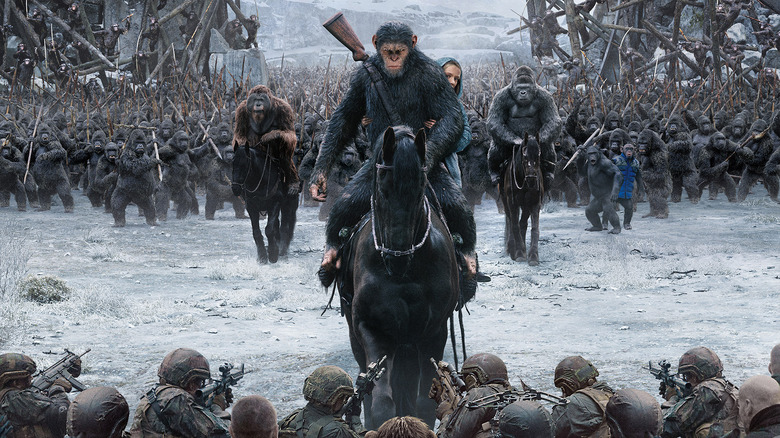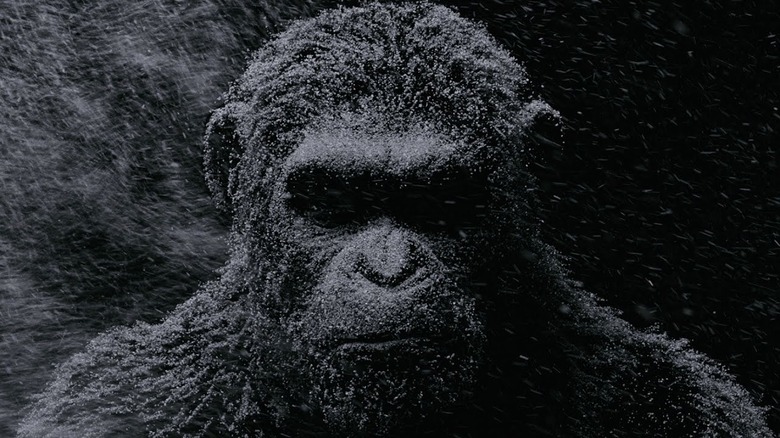Will There Be A Sequel To War For The Planet Of The Apes? Here's What We Know
(Welcome to Will There Be a Sequel?, a series where we answer that question and explore what comes next.)
Fox, long before Disney purchased the studio, hit one of the most unlikely homeruns in the modern era of blockbuster filmmaking with 2011's "Rise of the Planet of the Apes." Directed by Rubert Wyatt, the reboot served as a modern reinvention of the "Planet of the Apes" franchise, opting to go the prequel route to tell the story in a more linear fashion. They weren't going to repeat the mistakes of Tim Burton's ill-fated remake.
The movie's success prompted two sequels, 2014's "Dawn of the Planet of the Apes" and 2017's "War for the Planet of the Apes." Four years removed, we are left with a burning question: is there going to be another sequel in the franchise? The answer, it turns out, is complicated. But one thing is for sure, we are getting more "Planet of the Apes," one way or another.
Disney is Making Another Planet of the Apes Movie for Sure
Disney purchased most of Fox's media assets in a landmark deal valued at more than $71 billion. The deal went into effect back in 2019 and gave Disney a massive library to exploit largely for the purposes of streaming. The library helped to beef up Disney+ and Hulu, but it also gave the studio a great many franchises to exploit, "Planet of the Apes" among them.
Before long, it was confirmed that a new "Planet of the Apes" movie was happening. Wes Ball ("The Maze Runner") was tapped to direct the latest entry in the long-running sci-fi franchise, with Josh Friedman penning the screenplay. To this day, much remains mysterious. However, in an interview with Discussing Film, Ball did imply that they aren't going to fully reboot the series:
"We have a take. We have a way of staying in the universe that was created before us, but we're also opening ourselves up in being able to do some really cool new stuff. Again, I'm trying to be careful here. I'll say this, for fans of the original three don't worry — you're in good hands."
This is something Ball also reiterated on Twitter shortly after the news first came to light.
It’s never been easier for film journalists to actually get in touch with the actual people who actually know... but maybe it’s the point to NOT fact-check these days?
Regardless. Don’t worry. I won’t ruin the surprises, but it’s safe to say Caesar’s legacy will continue...🤫
— Wes Ball (@wesball) February 17, 2020
Ball also is careful to note that Rick Jaffa and Amanda Silver, the screenwriters who helped craft the most recent trilogy, are involved. So, while that doesn't totally answer the complicated question of whether or not "War for the Planet of the Apes" is getting a direct sequel, we do know for sure Disney isn't abandoning the franchise.
Did War for the Planet of the Apes Leave the Door Open for a Sequel?
"War for the Planet of the Apes" accomplished a relatively rare feat in modern blockbuster filmmaking. It managed to conclude the story of Andy Serkis' Caesar, who we had primarily been following for three movies, while also leaving the door open for more stories in the future. While Caesar ultimately died to help save his fellow apes, they were afforded the chance to start anew in a land far removed from the war between the humans.
The remaining apes, including Caesar's family and Maurice, could undoubtedly continue on. The franchise could continue to build on what came before while shifting focus. Yes, the narrative, in some ways, reached its logical conclusion with "War," but that doesn't mean we're done. Director Matt Reeves, rather brilliantly, positioned things to be satisfying one way or the other. We don't necessarily need more. But if we get more, there are plenty of places to go.
Reeves, for his part, hinted that he would like to come back to tell more stories in this universe, provided the opportunity. He is currently busy directing "The Batman," but in an interview back in 2017 around the time "War" hit theaters, the filmmaker had this to say about future tales in this universe:
"Future conflicts in this kind of epic journey [may] take us toward the '68 movie without necessarily ever getting there [and] could be about conflicts between apes, not just conflicts between humans and apes. And so, to me there are many more exciting stories to be told, and I would love to tell those stories."
Is a War for the Planet of the Apes Sequel Commercially Viable?
Perhaps the most important question for Disney in determining a direction here is commercial viability. Part of what made the most recent "Planet of the Apes" trilogy so appealing is that the movies had a real point of view. They had real artistry to them, while also serving as wholly entertaining blockbusters. I would go so far as to call "Dawn of the Planet of the Apes" and "War for the Planet of the Apes" masterpieces of the sci-fi genre, right alongside the original film from 1968.
But what story do the numbers tell? "Dawn of the Planet of the Apes" carried a reported $170 million budget, taking in $710 million at the global box office. Those are the sort of numbers that get studio heads to pop the champagne. "War for the Planet of the Apes" did well, though not quite as well as its predecessor. With a budget of $152 million, it earned $489 million worldwide. Every studio in Hollywood would take that return, eight days a week. However, it is important to acknowledge that there was a big drop-off between installments. That is something Disney has to factor in here.
The other unfortunately unrelenting elephant in the room is the pandemic. More to the point, what the pandemic has done to the global theatrical marketplace. Exclusive theatrical windows have shrunk for good. At best, a movie is going to get 60 days in theaters before making its way to premium VOD. In many cases, it's going to be less. The box office is an uncertain place and there is no telling when things will get back to relative normalcy. The point is, whatever a "War for the Planet of the Apes" sequel might have done for Disney financially at one point is no longer the reality.
So where does that leave us? In the end, we're getting a new "Planet of the Apes" movie of some kind. If we're reading between the lines, it seems like Disney and the creative team are going to avoid calling this a reboot, but they probably want to avoid taking in any baggage. It's a new studio, a new era of blockbuster filmmaking and a new director. If there are Vegas odds on this, let's go with the term "soft reboot" for the win. Though that is largely speculative. Let's just hope they avoid another direct remake, as Tim Burton and Mark Wahlberg showed us the dangers of that approach. We need not wander down that tragic road again.



